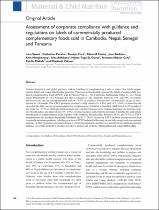| dc.contributor.author | Sweet, Lara | |
| dc.contributor.author | Pereira, Catherine | |
| dc.contributor.author | Ford, Rosalyn | |
| dc.date.accessioned | 2022-11-09T12:58:44Z | |
| dc.date.available | 2022-11-09T12:58:44Z | |
| dc.date.issued | 2016 | |
| dc.identifier.citation | Sweet, L. et al. (2016) Assessment of corporate compliance with guidance and regulations on labels of commercially produced complementary foods sold in Cambodia, Nepal, Senegal and Tanzania. Maternal and child nutrition. [Online] 12 (S2), 106–125. | en_US |
| dc.identifier.issn | https//doi.org:/10.1111/mcn.12268 | |
| dc.identifier.uri | http://hdl.handle.net/10566/8157 | |
| dc.description.abstract | National legislation and global guidance address labelling of complementary foods to ensure that labels support
optimal infant and young child feeding practices. This cross-sectional study assessed the labels of commercially produced
complementary foods (CPCF) sold in Phnom Penh (n = 70), Cambodia; Kathmandu Valley (n = 22), Nepal;
Dakar Department (n = 84), Senegal; and Dar es Salaam (n = 26), Tanzania. Between 3.6% and 30% of products
did not provide any age recommendation and 8.6 20.2% of products, from all sites, recommended an age of introduction
of <6 months. Few CPCF products provided a daily ration (0.0 8.6%) and 14.5 55.6% of those that did
exceeded the daily energy recommendation for complementary foods for a breastfed child from 6 to 8.9 months of
age.Only 3.6 27.3%of labels provided accurate and completemessages in the required language encouraging exclusive
breastfeeding, and almost none (0.0 2.9%) provided accurate and complete messages regarding the appropriate
introduction of complementary foods together with continued breastfeeding. Between 34.3% and 70.2% of CPCF
manufacturers also produced breastmilk substitutes and 41.7 78.0% of relevant CPCF products cross-promoted their
breastmilk substitutes products. Labelling practices of CPCF included in this study do not fully comply with international
guidance on their promotion and selected aspects of national legislation, and there is a need for more detailed normative
guidance on certain promotion practices in order to protect and promote optimal infant and young child feeding. | en_US |
| dc.language.iso | en | en_US |
| dc.publisher | John Wiley & Sons Ltd. | en_US |
| dc.subject | National legislation | en_US |
| dc.subject | Infant and young child feeding | en_US |
| dc.subject | World health organisation | en_US |
| dc.subject | Breast-milk Substitutes | en_US |
| dc.title | Assessment of corporate compliance with guidance and regulations on labels of commercially produced complementary foods sold in Cambodia, Nepal, Senegal and Tanzania | en_US |
| dc.type | Article | en_US |

